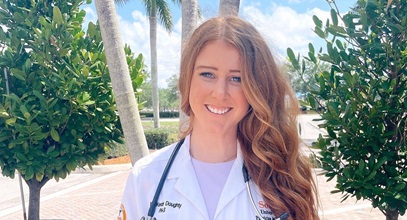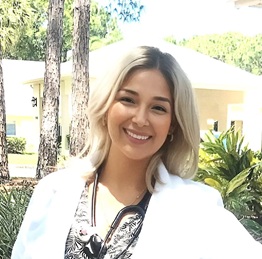Nurse Educator

Request Information
Master of Science in Nursing in Nurse Educator

Nurse educators merge clinical expertise with a passion for teaching into rewarding careers mentoring current and future generations of nurses. With South University Tampa's Master of Science in Nursing with a Specialization in Nurse Educator degree program, you’ll have the opportunity to develop and practice curriculum development strategies, teaching methods, and evaluation techniques for the classroom and clinical practice. The Nurse Educator MSN program combines clinical expertise* and a passion for teaching into rich and rewarding careers. These professionals, who work in the classroom and the practice setting, are responsible for preparing and mentoring current and future generations of nurses. Nurse educators play a pivotal role in strengthening the nursing workforce, serving as role models and providing the leadership needed to implement evidence-based practice.
The core MSN degree curriculum is designed to strengthen your skills in evidence-based practice, health promotion, disease prevention, healthcare policy, and more. In the Nurse Educator courses, you’ll explore ways to strengthen the nursing workforce through designing, implementing, evaluating, and revising academic and continuing education nursing programs.
*Programs, including all Clinical/Medical programs, have a required in-person clinical, practicum, or externship. We cannot guarantee flexibility in these components of the program.
Commission on Collegiate Nursing Education
The Bachelor of Science in Nursing, the Master of Science in Nursing, and Doctor of Nursing Practice Programs at South University are accredited by the Commission on Collegiate Nursing Education (http://www.ccneaccreditation.org).
Admission Requirements
Procedure for Admission to Master of Science in Nursing Programs
Note: Not all Online Program offerings are available to residents of all U.S. states. Please contact an admissions representative for further information.
The criteria to determine admission to the Master of Science in Nursing degree program include:
- Completion of the application for admission
- A bachelor's degree in nursing (BSN) from an accredited institution with a cumulative GPA of 2.5 or better on a 4.0 scale; or a master's degree in nursing (MSN/MN) from an accredited institution.
- Submission of official transcripts from every college or university attended within 5 weeks of the class start date (refer to Conditional Acceptance).
- A valid and unencumbered license as a Registered Nurse in all US states or territory in which the student is licensed, including the state in which the student completes all assignments and clinical rotations, for entry and maintenance of admission to the program. (Note that military, federal, and foreign educated nurses must meet their state/territory requirement for nursing licensure).
For additional admissions information please see the admissions section here.
Course Requirements
Outcomes
Upon completion of the program, students will be able to:
Synthesize current scientific research, theories, and concepts from nursing and other disciplines for application in advanced nursing roles.
Collaborate directly with other healthcare professionals using evidence-based resources and technologies in various aspects of the advanced nursing leadership role.
Model a professional leadership role to formulate comprehensive plans of action for ongoing contributions to healthcare system improvements.
Formulate a plan for ongoing contributions to improvement of healthcare delivery and development of health policy in a cost-effective manner.
Demonstrate ethical and legal standards of practice in the decision-making process to assist with the delivery of quality care associated with a specialty area of advanced nursing practice
- Contribute too all phases of curriculum development for a variety of educational and healthcare settings.
- Develop quality healthcare contributions through the development of evidence-based policies for creating change and advancing the profession.
- Develop educational quality improvement plans which contribute to the creation of evidence that underlies best practices in teaching and learning.
Comments and Concerns
All Fields Are Required
The purpose of this form is to provide a process for the general public to submit comments, concerns, or complaints regarding their interaction with the Bachelor of Science in Nursing, Master of Science in Nursing, or Doctor of Nursing Practice program. A record of all complaints will be maintained and secured by campus administration. If you are a South University student, please submit your comments, concerns, or complaints according to the process outlined in the University Catalog or programmatic handbook. Please contact your Program Director or Academic Counselor if you need additional guidance.
Success! Your request was submitted. We’ll be in touch soon!
In the meantime, you can view some of our FAQs. here
Career Outlook
With your degree program complete, you'll be qualified to pursue a career* as an Undergraduate Nursing Faculty (additional certifications may be required).
*South University does not promise or guarantee licensure, employment, or salary amounts.
What's New
Latest News and Blogs

Jun 05, 2024
Alumni Spotlight: Landing a Surgery Residency at Johns Hopkins
Paloma Loperena, a 2024 graduate of the Master of Science in Physician Assistant program, is going through a surgical residency at John Hopkins.

Jun 04, 2024
Alumni Spotlight: Earning a PA Residency at Johns Hopkins
MacKenzie Doughty, a 2024 graduate of the Master of Science in Physician Assistant program, has been accepted into the John Hopkins system.

Mar 05, 2024
Exploring Physician Assistant Specialization Options
Physician Assistants are essential members of the healthcare team who work closely with physicians and other healthcare professionals to provide quality care to patients.

Feb 24, 2026
The Growing Need for Mental Health Counselors
Learn why the need for mental health counselors is growing, how high the demand is, and the types of valuable services they provide to clients.

Feb 18, 2026
PTA Alumni Spotlight: Veteran Leads Home Health Agency
See how South University helped US military veteran Waddie Freeman grow his career in healthcare, from becoming a PTA to running a home health agency.

Feb 17, 2026
The Future of Home Care: Trends and Predictions
Learn what home care trends are driving growth in home health care, including an aging population, new technology, and evolving payment models.
Fill out the form and a representative will contact you today to better understand your academic goals plus answer any questions you may have.
Campuses offer flexible learning formats* including: on-campus, virtual instructions, and online courses.
*Clinical, practicum, and externship requirements exist in certain programs and require field experiences. Learning formats may not be flexible.
Success! Your request was submitted. We'll be in touch soon!
In the meantime, you can view some of our FAQs.
If you want to talk to an admissions representative ASAP, please contact us at (888) 444-3404.
Outstanding Education for Remarkable Careers
We're committed to helping our graduates make impact in their professional and personal lives. We applaud our nursing alumni and the difference they make. Check out what some of our nursing graduates have to say.





